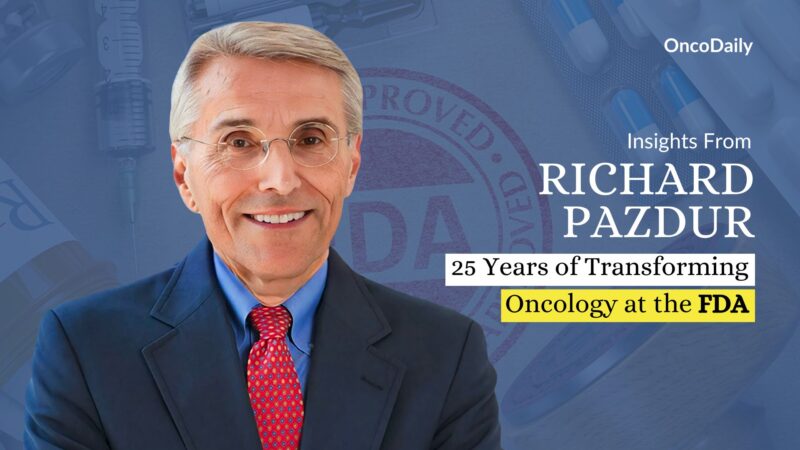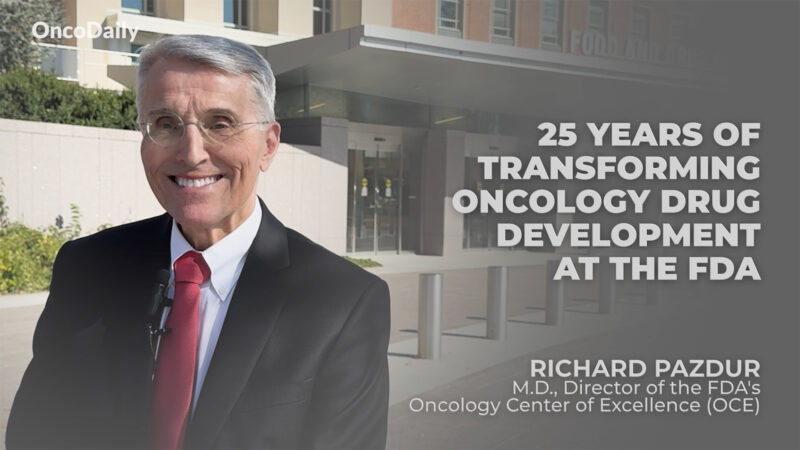Dr. Richard Pazdur, one of the most influential figures in oncology drug regulation, has been appointed Director of the U.S. Food and Drug Administration’s (FDA) Center for Drug Evaluation and Research (CDER). This appointment marks his invaluable role in the agency’s history, recognizing his decades-long leadership in advancing cancer therapeutics, patient-centered regulatory frameworks, and scientific innovation.
Early Life and Education
Dr. Pazdur was born and educated in the United States, earning his Bachelor of Science from Northwestern University in Evanston, Illinois. He received his Doctor of Medicine from Loyola University’s Stritch School of Medicine in Maywood, Illinois. Following medical school, he completed his residency and fellowship training in internal medicine and oncology at Rush–Presbyterian St. Luke’s Medical Center and the University of Chicago Hospitals and Clinics.
Before joining the FDA, Dr. Pazdur held prominent academic and clinical positions, most notably at The University of Texas M.D. Anderson Cancer Center in Houston, where he served as a faculty member and contributed to research and clinical oncology training. His academic background would later inform his regulatory philosophy, bridging clinical oncology, evidence-based medicine, and public health policy.
A Pioneering Career at the FDA
Dr. Pazdur joined the FDA in 1999 as Director of the Division of Oncology Drug Products within the Center for Drug Evaluation and Research. His impact was immediate: he recognized the need for specialized, efficient, and scientifically rigorous review processes for cancer drugs. In 2005, he led the creation of the Office of Oncology Drug Products, which later evolved into the Office of Hematology and Oncology Products and, subsequently, the Office of Oncologic Diseases.
In 2017, he founded the Oncology Center of Excellence (OCE) and became its inaugural director. The OCE unified the FDA’s review of oncology drugs, biologics, and devices under a single program, a structural and cultural innovation that allowed for more cohesive decision-making across regulatory divisions. Dr. Pazdur emphasized collaboration, patient engagement, and global regulatory alignment, setting new standards for how cancer therapies are evaluated and approved.
In November 2025, the FDA announced his appointment as Director of CDER, the agency’s largest center responsible for the regulation of both prescription and over-the-counter medications. His new leadership role extends his influence beyond oncology, encompassing the full spectrum of drug evaluation and research.
“I came to the FDA, and I realized the importance that the FDA had in shaping the drug development program of the world, basically. And I think it’s very important for people to realize that when a job came open such as this, I saw the opportunity, and I also saw the opportunity of how to change the FDA into a much more integrative, a much more interactive part of the oncology really community. So we had many programs aimed at community outreach, interactions with academic groups, with professional groups such as ASCO, AACR, ASH.” said Dr. Pazdur
Dr. Richard Pazdur: 25 Years of Transforming Oncology Drug Development at the FDA
Regulatory Innovation and Vision
Over the past two decades, Dr. Pazdur has transformed the regulatory landscape for cancer therapeutics. He has championed expedited review pathways and led the FDA’s efforts to modernize drug evaluation through initiatives such as Project Orbis, which enables concurrent international review of oncology products; Project Facilitate, a program designed to simplify access to investigational therapies for cancer patients; and Project Renewal, focused on updating outdated prescribing information for older oncology drugs.
His work has reshaped the concept of accelerated approval, balancing the urgency of access for patients with the need for rigorous post-marketing evidence. Dr. Pazdur is widely regarded as a pragmatic reformer who has maintained the scientific rigor of regulatory review while introducing flexibility to accommodate innovation in oncology drug development.
Publications and Academic Contributions
Dr. Pazdur’s contributions to medical science extend well beyond the FDA. He has authored or co-authored more than 800 scientific articles, book chapters, and abstracts, and has edited two major textbooks in medical oncology. His extensive publication record reflects a lifelong dedication to advancing clinical knowledge, fostering collaboration between academia and regulatory institutions, and mentoring a new generation of oncologists and regulatory scientists.
He is known for mentoring numerous fellows and young investigators, helping them understand the interplay between clinical research and policy. His leadership in education and mentorship has earned him wide respect within both the academic and regulatory communities.
Honors and Recognition
In 2025, Dr. Pazdur received the American Association for Cancer Research (AACR) Enduring Impact Award for Transformative Service to Cancer Science and Medicine, a recognition of his profound influence on oncology research and policy. His honors also include the Reagan–Udall Foundation Leadership Award, the Harvey W. Wiley FDA Alumni Award, and distinctions from leading professional societies such as the American Society of Clinical Oncology (ASCO).
Throughout his career, he has been celebrated not only for his regulatory achievements but also for his unwavering commitment to patients. He has consistently emphasized the importance of integrating patient voices into regulatory decision-making, ensuring that the FDA’s work reflects real-world patient needs and experiences.
The FDA and the Role of CDER
The U.S. Food and Drug Administration is a federal agency within the Department of Health and Human Services responsible for protecting public health by assuring the safety, efficacy, and security of drugs, biologics, and medical devices. Within the FDA, the Center for Drug Evaluation and Research (CDER) oversees the regulation of most prescription and over-the-counter drugs, a portfolio that affects millions of patients globally.
As the new CDER Director, Dr. Pazdur will oversee the agency’s broad drug-regulation agenda, guiding its scientific and policy direction at a time of rapid change in pharmaceutical innovation. His appointment is seen as a strategic move to bring the patient-centered, science-driven culture he cultivated in oncology to the wider realm of drug evaluation.
Dr. Richard Pazdur’s 25 Year WAR on Cancer at the FDA!
Leadership Philosophy and Future Directions
Dr. Pazdur’s leadership style is characterized by a balance of scientific precision and compassionate pragmatism. He has often stated that “the patient voice is an integral part of our regulatory decision-making,” underscoring his belief that policy must be guided by the lived realities of patients and families.
As medicine advances into an era of personalized therapeutics, digital biomarkers, and gene-based treatments, his experience will be critical in navigating emerging challenges. These include managing accelerated approvals, ensuring confirmatory trial completion, and strengthening international regulatory collaboration.
His new role positions him to extend oncology’s regulatory successes, such as faster access to innovative therapies and more transparent clinical data, to all therapeutic areas.
Dr. Pazdur’s career exemplifies how visionary leadership can transform not only an agency but also an entire field of medicine. From his early days as a clinician and educator to his current position as Director of CDER, he has consistently championed innovation, collaboration, and patient-centered science.
His appointment reflects not only recognition of past achievements but also confidence in his ability to lead the FDA through a new era of drug development. Under his guidance, the agency is poised to continue balancing scientific rigor with compassionate responsiveness, ensuring that progress in medicine translates into real benefit for patients worldwide.
Written by Nare Hovhannisyan, MD




